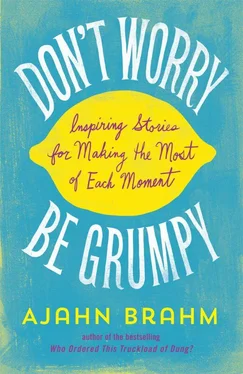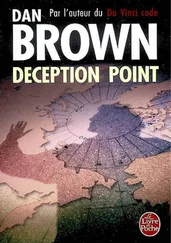Write out all the bad memories on a piece of paper as before. They need to be brought to the surface before they can be deleted. Only this time use a special type of paper, the most appropriate material for shitty memories. Write them out on a roll of toilet paper. When you have finished with the writing, take it to your bathroom, place the paper with the stinky writing in the toilet bowl where it belongs, and then flush!
A long time ago a king was out hunting when he cut his finger. He summoned his doctor, who always accompanied him on the hunt, and the doctor put a bandage over the wound.
“Is it going to be all right?” asked the king.
“Good? Bad? Who knows?” replied the doctor, and they carried on hunting.
By the time they had returned to the palace, the wound had become infected, and so the king summoned his doctor again. The doctor cleaned the wound, carefully applied some ointment, and then bandaged it.
“Are you sure it’s going to be okay?” asked the king, becoming concerned.
“Good? Bad? Who knows?” replied the doctor again. The king became worried.
The king’s worry was confirmed when, in a few days, the finger was so badly infected that the doctor had to amputate it! The king was so furious with his incompetent doctor that he personally escorted him to the dungeon and threw him in a cell.
“Well, Doctor, how do you like it, being in jail?”
“Being in prison, Sire… Good? Bad? Who knows?” replied the doctor with a shrug of his shoulders.
“You are insane as well as incompetent!” declared the king and departed.
A few weeks later, when the wound had healed, the king was out hunting again. Chasing an animal, he became separated from the others and ended up lost in the forest. Wandering in the woods, he was captured by the indigenous forest people. It was their holy day, and they had found a sacrifice for their jungle god! They tied the king to a large tree, and their priest began chanting and dancing as the forest people sharpened the sacrificial knife. The priest took the blade and was about to cut the king’s throat when he shouted, “Stop! This man has only nine fingers. He is not perfect enough to sacrifice to our god. Set him free.”
In a few days, the king found his way back to his palace and went straight to the dungeon to say thank you to the wise doctor.
“I thought you were stupid saying all this ‘Good? Bad? Who knows?’ nonsense. Now I know you were right. Losing my finger was good. It saved my life. But it was bad of me to lock you in jail. I’m sorry.”
“What do you mean, Sire? Had you not put me in jail, I would have been there with you on the hunt, and I would have been captured too. And I have all my fingers!”
A man told me that in 1977 he was returning from a business trip to the Indian city of Mumbai. The trip had gone well, and he had ordered a taxi to take him to the international airport in plenty of time to check in. However, the taxi got lost. The driver, even though he was a local, couldn’t find the way. As the minutes ticked by, the businessman was getting more and more concerned that he would miss his flight. He started getting angry at the taxi driver. The driver only got more confused.
Soon, the businessman realized that his only hope of catching his flight would be if it were delayed, which was quite common in those days. But when they finally approached the airport, his last hope was dashed. He saw his plane taking off. For once, the flight departed on schedule.
“You stupid taxi driver! You of all people should know the way to the airport. You should never again be allowed to drive taxis. You have made me miss my flight! You idiot!” shouted the businessman in a rage.
Then he looked up and watched as the aircraft fell from the sky. It crashed, and all on board were killed.
“You wonderful taxi driver! You are so wise. If only all taxi drivers were as clever as you. Please take a large tip!”
That man told me that the experience had changed his whole life. He doesn’t get so angry anymore when things do not go according to plan. Instead, he notes, “Good? Bad? Who knows?”
I received a phone call from an officer at a local prison. He wanted to speak to me personally to invite me to come back to his prison to teach. I replied that I was very busy now with many more duties than in the old days when I used to visit regularly. I promised that I would send another monk.
“No!” he replied. “We want you.”
“Why me?”
“I have worked in prisons most of my life,” explained the guard, “and I have noticed something very unique with you. All of the prisoners who attended your classes never returned to jail once they were released. Please come back.”
That is one of the compliments I treasure most. I thought about it afterward. What had I done that others hadn’t that had genuinely reformed those in jail? I figured out that it was because, in all my years teaching in prisons, I had never once seen a criminal.
I have seen many people who had committed murder, but I have never seen a murderer. I have seen many people who had stolen from others, but I have never seen a thief. I have even seen people who had committed terrible sex crimes, but I have never seen a sex offender. I saw that the person was more than the crime.
It is irrational to define people by one or two, or even several, horrific acts that they have done. It denies the existence of all the other deeds that they have performed, the many noble acts. I recognized those other deeds. I saw peoplewho had done a crime, not criminals.
When I saw the people not the crimes, they also saw the good part of themselves. They began to have self-respect, without denying the crime. Their self-respect grew. When they left jail, they left for good.
The Stigma of Mental Illness
I told the above story at a conference on mental health a few years ago. One of the department heads at a prestigious mental health facility was very impressed. He invited me to “bless” his building.
“What form of mental illness are you involved in?” I asked.
“Schizophrenia,” he replied.
“And how do you treat the schizophrenia?” I enquired.
“Just like you explained in your presentation,” he responded. “I don’t treat the schizophrenia. I treat the other parts of the patients.”
I raised my hands up in the Buddhist gesture of respect to him. He had understood.
“What are the results?” I asked, even though I knew what the answer would be.
“Brilliant! Much better than any other treatment,” he answered.
When you call people schizophrenic, they are likely to live up to your label. You have stigmatized them. When you regard them as people who suffer episodes of schizophrenia, that they are more than their illness, then you give the healthy part a chance to grow.
“Are you at peace with your impending death?”
I often say these words to people who are close to death. My aim is to convince them that it is okay to die, that there is nothing wrong with it. Then they can die with dignity and at peace.
Many such people tell me that they have already made peace with their coming death. The problem, they say, is that their relatives and close friends will not let them go. “Mother, mother, please don’t die! Please get better. Please!” This becomes their greatest source of suffering.
Steve was a young Buddhist in his thirties. He had a successful tour company that took his clients whitewater rafting in some of the most beautiful locations in the world. Unfortunately, he was dying of an incurable cancer.
Читать дальше










